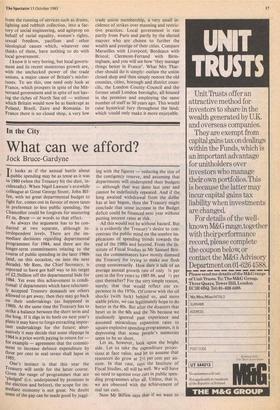In the City
What can we afford?
Jock Bruce-Gardyne
It looks as if the annual battle about public spending may be as tense as it was in 1980 (when the Treasury bit the dust, in- cidentally). When Nigel Lawson's erstwhile colleague at Great George Street, John Bif- fen, with no great departmental budget to fight for, comes out in favour of more taxes in preference to less public spending, the Chancellor could be forgiven for muttering Et tu, Brute — or words to that effect.
As always the argument has to be con- ducted at two separate, although in- terdependent levels. There are the im- mediate decisions regarding departmental Programmes for 1984, and there are the longer-term commitments relating to the course of public spending in the later 1980s (and, on this occasion, on into the next decade). Mr Rees, the Chief Secretary, is reported to have got half way to his target of £2.5billion off the departmental bids for 1984. Yet even this achievement is condi- tional: if departments which have reluctant- 1Y accepted Treasury demands see others allowed to get away, then they may go back on their undertakings (as happened in 1980). At the same time the Treasury has to strike a balance between the short term and the long. If it digs in its heels on next year's Plans it may have to forgo extracting impor- tant undertakings for the future; alter- natively it may decide that some slippage in 1984 is a price worth paying in return for — for example — agreement that the commit- ment to increase defence expenditure by three per cent in real terms shall lapse in 1985.
One's instinct is that this year the Treasury will settle for the latter course. Given the range of programmes that are Pledged' (i.e. underpinned by promises in the election and before), the scope for im- mediate economy is not great. No doubt some of the gap can be made good by juggl- ing with the figures — reducing the size of the contigency reserve, and assuming that departments will underspend their budgets — although that was done last year and cannot be indefinitely repeated. And if the long awaited withdrawal from the dollar has at last begun, then the Treasury might conclude that some increase in the Budget deficit could be financed next year without putting interest rates at risk.
All this would not be without hazard. But it is evidently the Treasury's desire to con- centrate the public mind on the sombre im- plications of spending trends towards the end of the 1980s and beyond. From the In- stitute of Fiscal Studies to Mr Samuel Brit- tan the commentators have mostly damned the Treasury for trying to make our flesh creep unnecessarily. How dare it talk of an average annual growth rate of only 1/4 per cent in the five years to 1985-86, and V2 per cent thereafter? For the very simple reason, surely, that that would reflect our ex- perience in the 1970s. Of course with the oil shocks (with luck) behind us, and more stable prices, we can legitimately hope to do better in the 80s. But after the disasters that beset us in the 60s and the 70s because we studiously ignored past experience and assumed miraculous expansion rates to square explosive spending programmes, it is depressing that some people's memories seem to be so short.
Let us, however, look upon the bright side. Let us take the expenditure projec- tions at face value, and let us assume that resources do grow at 21/2 per cent per an- num. In that case, says the Institute of Fiscal Studies, all will be well. We will have no need to agonise over cuts in public spen- ding programmes after all. Unless, that is, we are obsessed with the achievement of real tax cuts.
Now Mr Biffen says that if we want to
avoid taking risks with future inflation rates we would be well advised to keep the Budget deficit on a shrinking path, and I agree with him. He also says that if that means forgoing real reductions in the burden of taxation, then so be it. And again, I agree with him. Where I begin to part company is when he implies — as does the Institute of Fiscal Studies — that the case for lower taxation rests upon the assumption that lower taxes set us all to work much harder. I accept that that is, at best, unproven. But .the philosophic case for a shift to less taxation and the essential corollary of less growth in public spending rests on an entirely different proposition: that individuals are better judges of how to spend the extra wealth created than is the ,state.
If that is your stance — and with all respect to John Biffen I would argue that that is not only the stance of the Prime Minister and the Chancellor, but also the stance on which the Government sought renewal of its mandate back in June — then the health warnings paraded on the Treasury's long-term spending exercise do need to be taken seriously. At best we can hope to hold the present balance. If we want to move that balance — and not necessarily in favour of the better off: we might want to narrow the 'poverty trap', and shift the tax threshold back towards the average earnings level where it surely ought to be — then we are going to have to face up to the sort of major changes in public spending prospects which the Treasury, by implication, is asking us to contemplate.
Certainly they are not easy. Can we af- ford Trident? Fortress Falklands? Cost- plus contracts in defence procurement? The prolongation of the three per cent real growth in the defence budget commitment into and beyond 1985? Personally I doubt it, not least because against that background I do not believe that we could look towards the sort of retrenchment in domestic spending programmes which the Treasury is going to need if it is to achieve the shift in balance between public provi- sion and private choice it seeks (and I am bemused by John Biffen's conclusion that any significant savings in defence expen- diture lie beyond the time-scale of the pre- sent Parliament). But obviously these are all contentious items, to put it mildly.
The options in the major domestic spen- ding programmes are at least equally con- tentious. There may be a case for financing the NHS and retirement out of a social security tax rather than, in substantial part, out of general taxation. But that is essen- tially a book-keeping transaction, which would not much impress John Citizen. The real choices are a lot more difficult: should we raise the age of notional retirement to reflect longevity? Can we indefinitely main- tain the real purchasing power of the na- tional old age pension when the real pur- chasing power of those within the active section of the population may not be similarly sustained? Can we widely extend the principle of user charges in the NHS? Or move to primary reliance on private health insurance? The popular answers may, in every case, or at least in most, sup- port the status quo. But if the Treasury can educate people to begin to understand the repercussions of their answers for the bot- tom line of their pay packets after deduc- tions, then the purpose of asking the ques- tions will have been fulfilled.











































 Previous page
Previous page